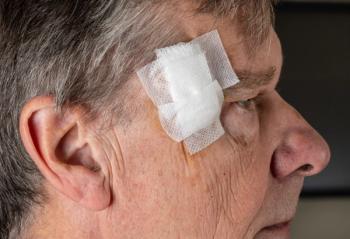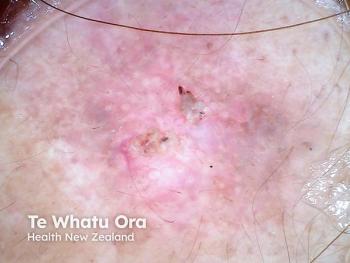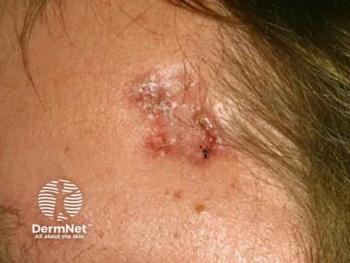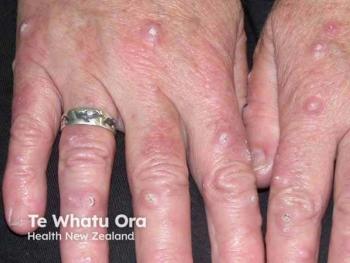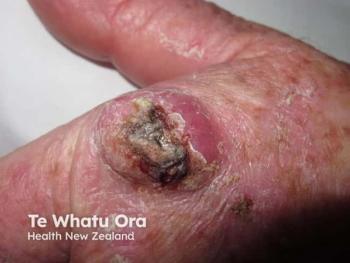
The Immune Profile of Merkel Cell Carcinoma
New clues about the immune system response to MCC may be able to help guide future treatment strategies.
Merkel cell carcinoma (MCC) is a highly malignant form of skin cancer with a rather mysterious pathogenesis. However, new clues about the immune system response to MCC may be able to help guide future treatment strategies.
The rare nature of this disease, alongside its primary appearance in older adults, has made the development of MCC difficult to understand. In addition to the mysterious origins of this type of cancer, another characteristic that adds to questions about Merkel cell carcinoma is its ability to spontaneously regress in a surprising number of cases.
Merkel cell carcinoma is highly immunosensitive, which may explain this spontaneous regression. MCC has an overall recurrence rate of 33% to 36%, according to a 2022 paper in the Journal of Dermatology, as well as a regional lymph node metastasis rate of 41% to 55%, and a distant metastasis rate of up to 35%. In the advanced stages of the disease, the five-year survival rate is just 0% to 18%, according to research. Although rare—affecting about 3 in a million people—the frequency of Merkel cell carcinoma is on the rise.
Perhaps one factor in this rise is advances in diagnosis, especially in cases of spontaneous regression. Between 1.7% and 3% of Merkel cell carcinomas have complete spontaneous regression, and roughly 14% of cases of Merkel cell carcinoma that are diagnosed are identified as lymph node lesions rather than skin lesions.
These diagnoses typically have a better prognosis than advanced Merkel cell carcinoma with a primary skin presentation, possibly because the lymph node metastasis is the secondary remains of a primary lesion that had disappeared.
When it comes to uncovering the pathogenesis of Merkel cell carcinoma, there are several possibilities, but DNA damage and viral infection are the most common.
Primary Merkel cell carcinomas are more likely to be rooted in DNA damage from ultraviolet radiation than other causes, and overall the condition has a much higher mortality rate in people who are in an immunocompromised state. According to the report, about 10% of people who develop Merkel cell carcinoma are immunocompromised in some way, and their survival rates are about half that of patients who are not immunocompromised.
In cases that develop from viral origins, the polyomavirus believed to trigger Merkel cell carcinoma was discovered in 2008. Infection with the virus itself isn’t rare, but geographical differences related to sun exposure and skin tone impact the effect the virus has on Merkel cell carcinoma development, the report suggests.
Another observation made in the report about the immune profile of Merkel cell carcinoma is the fact that these tumors have a high tumor mutation burden (TMB), meaning they produce more mutated proteins that our immune systems recognize as foreign bodies. This is an important designation, as a high TMB generally means that immunotherapies will be more effective in fighting these cancers.
Research has uncovered other specifics to Merkel cell carcinoma, including expression of programmed death ligand 1 (PD-L1) and glucose-6-phosphate dehydrogenase. The expression of these biomarkers can provide clues about tumor activity and overall prognosis. Although the correlation between PD-L1 expression and prognosis is debated, G6PD expression is linked to a poor prognosis in a number of cancer types, including Merkel cell carcinoma, the study reveals. Finally, the study notes that the absence of G6PD expression can also predict a stronger therapeutic response to chemotherapy.
The study authors use these immunological observations to make several recommendations that can be used to guide treatment.
- In cases where G6PD is high and PD-L1 is low, tumor growth is aggressive and immune sensitivity is low. This makes up about 40% of MCC cases.
- In cases where G6PD is high and PD-L1 is high, tumor immunity is high and tumor growth is aggressive. This combination makes up about 10% of MCC cases.
- When G6PD and PD-L1 are both low, there is high immune activity in the tumor and the immune system is suppressed. This makes up roughly 20% of MCC cases.
- Where G6PD is low and PD-L1 is high, tumors have high levels of immune activity and these cases of MCC—about 30% overall—have a better prognosis.
Additional studies on these immune observations are needed to further guide clinical practice, according to the report, but early data may help clinicians select treatment strategies.
New guidelines on resection margins, the use of systemic medications like PD-1 inhibitors, and even the use of adjuvant therapies may all be impacted by the immunogenicity of MCC, the study concludes. Classification and treatment strategies could be developed as this immunological data becomes more clear, according to the research team, allowing for more effective treatments for MCC as well as other carcinomas.
Reference
- Nakamura M, Morita A. Immune activity in Merkel cell carcinoma. J Dermatol. 2022;49:68-74. doi:10.1111/1346-8138.16232
Newsletter
Like what you’re reading? Subscribe to Dermatology Times for weekly updates on therapies, innovations, and real-world practice tips.

